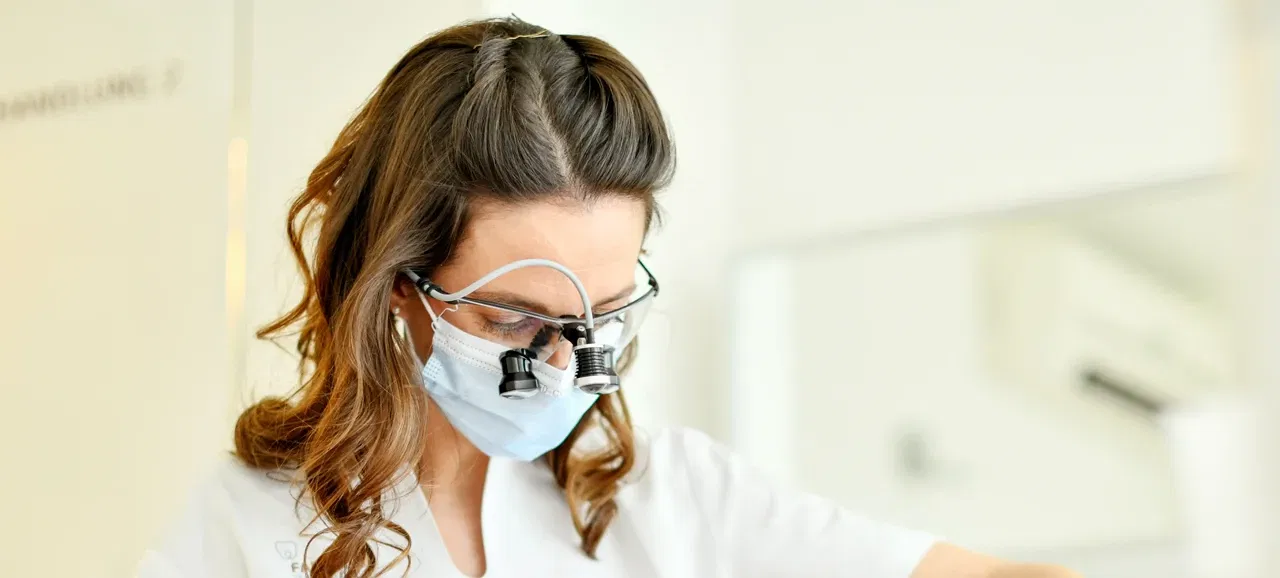Termine

Verantwortungsbereiche einer Dentalhygienikerin
Die Fähigkeiten und Kompetenzen einer Dentalhygienikerin erstrecken sich auf ganz unterschiedliche Gebiete und reichen deutlich weiter als die einer Prophylaxe-Assistentin. Eine professionelle Zahnreinigung oder Zahnstein entfernen führt eine Fachkraft für Dentalhygiene selbstständig durch.
Im Rahmen der unmittelbaren beruflichen Tätigkeit der Präventivzahnmedizin ergeben sich folgende Aufgaben:
- Erhebung und Dokumentation von Befunden für die Behandlungsplanung sowie Erstellung eines individuellen Behandlungsplanes in Zusammenarbeit mit Zahnarzt und Patient
- Behandlung einer Gingivitis (Zahnfleischentzündung) sowie Spezialisierung auf die Betreuung von Patienten mit Parodontitis (Entzündung des gesamten Zahnhalteapparates)
- klinische und röntgenologische Untersuchungen von Patienten hinsichtlich krankhafter Veränderungen an Zähnen und Zahnfleisch
- Entfernung oberflächlicher Verfärbungen auf Zahnoberflächen, Fluoridierung der Zähne sowie Desensibilisierung empfindlicher Zahnhälse
- nichtchirurgische Parodontaltherapie mit der Entfernung von Plaque und Zahnstein auf Zahn- und Wurzeloberflächen auch unterhalb des Zahnfleischs (Deep Scaling)
- professionelles externes Zahn Bleaching
- Politur von Füllungen, Kronen und Brücken
- Entfernung von Plaque und Zahnstein auf Zahn- und Wurzeloberflächen
- Patientenberatung im Sinne einer Motivation zur optimalen Mundhygiene sowie einer Ernährungsberatung hinsichtlich der Mundgesundheit und zum Tabakverzicht
- bei Risikopatienten vorab Information an die Zahnärzte
- Beachtung von Qualitätsstandards
- Unterstützung der Zahnärzte bei Gesundheitsaktionen
Neben dem zahnmedizinischen Aspekt sowie manueller Geschicklichkeit ist auch das Interesse an allgemeinen gesundheitlichen Themen für die Berufswahl unabdingbar, da zahnmedizinische Prophylaxe und Gesundheitsvorsorge eng zusammenhängen. Daneben sind ausserdem zwischenmenschliche Fähigkeiten wie eine gute Kommunikations- und Teamfähigkeit sowie Flexibilität gefragt. Im Kontakt mit Patienten und Kollegen bewähren sich Einfühlungsvermögen, gute Beobachtungsgabe und Geduld, aber auch Durchsetzungsvermögen und Problemlösungsfähigkeit an der richtigen Stelle.
Die Ausbildung zur Dentalhygienikerin
Um eine Ausbildung zur Dentalhygienikerin beginnen zu können, muss das 18. Lebensjahr vollendet sein; eine abgeschlossene Berufsausbildung sowie ein bestandener Eignungstest sind nachzuweisen. Während der dreijährigen Ausbildung an einer der vier höheren Fachschulen (HF) werden theoretische Grundkenntnisse vermittelt, manuelle Fähigkeiten geübt sowie psychologische Hintergründe zur Arbeit mit Patienten erworben.
Die praktische Arbeit an Modellen und Patienten sowie ein intensives Praktikumsjahr in einer Zahnarztpraxis runden die Ausbildung an der Fachschule ab. Nach einem erfolgreichen Examen erhalten die Absolventen den eidgenössisch anerkannten Titel „Diplomierte Dentalhygienikerin HF“ beziehungsweise „Diplomierter Dentalhygieniker HF“.
Praktikantinnen werden immer gerne in einem SSO-Lehrbetrieb angenommen und betreut. SSO ist die Kurzbezeichnung der Schweizerischen Zahnärzte-Gesellschaft und die Abkürzung für Société suisse des médecins-dentistes, Società svizzera odontoiatri oder auch Swiss Dental Association. Zahnärzte einer SSO-Zahnarztpraxis investieren ein hohes Zeitvolumen in ihre Fortbildung und verstehen die Erhaltung der Mundgesundheit ihrer Patienten als oberste Priorität. Daher können sie angehende und fertige Dentalhygienikerinnen bestens auf ihrem beruflichen Weg begleiten. Auch der fachspezifische Unterricht während der Ausbildung zur Dentalhygienikerin liegt in den Händen der SSO.
Wie geht es nach der Ausbildung weiter?
Dentalhygienikerinnen sind für die Behandlung von kleinen Kindern bis hin zu Senioren verantwortlich. Eine fertige Dentalhygienikerin arbeitet hauptsächlich in Privatpraxen, aber auch in Heimen, Schulen, Spitälern, zahnmedizinischen Kliniken und Dentalhygieneschulen sowie in der Industrie oder in selbstständiger Berufstätigkeit in der eigenen Praxis. Ein betriebswirtschaftliches Interesse, dazu auch Führungsstärke sowie psychische und physische Belastbarkeit sind im Berufsalltag dieser vielseitigen Tätigkeit von grossem Vorteil.
Diplomierte Dentalhygienikerinnen sind im unabhängigen Schweizer Berufs- und Fachverband Swiss Dental Hygienists zusammengeschlossen. Dieser vertritt die beruflichen, sozialen und wirtschaftlichen Interessen seiner Mitglieder und engagiert sich im Rahmen der Aus- und Weiterbildung sowie für eine qualitätsorientierte Berufsausübung. Swiss Dental Hygienists bietet verschiedene Dienstleistungen wie Rechtsberatung und Stellenvermittlung und betreibt eine wirkungsvolle Öffentlichkeitsarbeit.
Die Dentalhygienikerin sorgt für Zahngesundheit und Ästhetik
Die Arbeit einer Dentalhygienikerin fördert nachweislich die Mundgesundheit. Ihr Ziel ist die Gesundheit von Zähnen und Zahnfleisch in Verbindung mit einem ästhetischen Gebiss für jeden Patienten. Da sie auch schwierige Fälle eigenverantwortlich behandeln kann, arbeitet die Dentalhygienikerin als Teil eines Teams weitgehend selbstständig und unterstützt dadurch Zahnärzte in kompetenter Weise bei den Aufgaben der Präventivzahnmedizin.
Eine Vorsorgeuntersuchung sollte am besten zweimal jährlich durchgeführt werden – dann können Karies und Zahnfleischerkrankungen rechtzeitig erkannt und behandelt werden. Gerade im frühen Stadium einer Zahnfleischentzündung kann der Entwicklung zur komplexen Entzündung des Zahnhalteapparates, einer Parodontitis, mit einfachen Mitteln vorgebeugt werden. Haben sich dagegen schon Zahnfleischtaschen entwickelt, sollte schnellstens eine gezielte Therapie erfolgen, um ein Übergreifen der Infektion auf den Körper zu verhindern.
Überzeugen Sie sich doch auf ganz direktem Weg vom Leistungsumfang einer Fachperson für Dentalhygiene. Sie möchten einen Termin zur Beratung, für eine professionelle Zahnreinigung oder für ein Bleaching? In unserer SSO-Zahnarztpraxis arbeitet eine diplomierte Dentalhygienikerin, die Sie gerne untersucht und berät sowie ein individuelles Behandlungskonzept mit Ihnen erstellt. Rufen Sie uns einfach an und vereinbaren Sie einen Termin!
